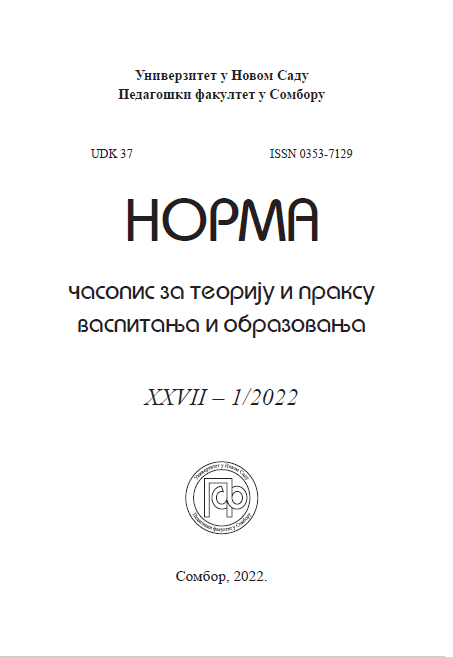21st Century Skills In Educational Standards For Lower Secondary Education In Slovakia
Abstract
The aim of this theoretical study is to identify the 21st century skills in the curricular documents for lower secondary education in Slovakia, and to analyse the overlap between the 21st century skills and aims of national educational standards for lower secondary education (ISCED 2) in Slovakia. The main method of the study is document analysis. The analysis shows that the Slovak educational standards are primarily focused on the development of knowledge and cognitive skills. Significantly less represented is development of interpersonal and intrapersonal skills. The results show that there are overall not sufficiently many references to the 21st century skills within the educational standards. This yields a crucial problem, as majority of Slovak teachers still consider the educational standards to be the basic part of curriculum. In spite of certain natural limitations, the study provides new information on the insufficient representation of the 21st century skills in the educational standards in Slovakia.
References
Ananiadou, K., & Claro, M. (2009). 21st Century Skills and Competences for New Millennium Learners in OECD Countries. Paris: OECD Publishing.
CCSS [Common Core State Standards] (2010). Washington, DC: National Governors Association and Council of Chief State School Officers. http://www.corestand-ards.org/.
Guerriero, S. (Ed.) (2017). Pedagogical Knowledge and the Changing Nature of the Teaching Profession. Paris: OECD Publishing.
ITEL (2017). Innovative Teaching for Effective Learning - Teacher Knowledge Survey. Paris: OECD Publishing.
Kaplan, A., & Flum, H. (2012). Identity Formation in Educational Settings: A Critical Focus for Education in the 21st century. Contemporary Educational Psychology, 37, 171-175.
Kowalski, M., & Albanski, Ł. (2018). Borders, Inequalities and Global Generations: A Preliminary Study on the use of Ulrich Beck’s Concepts in the Polish Context. The New Educational Review, 52, 76-85.
OECD (2017). PISA 2015 Results (Volume V): Collaborative Problem Solving. Paris: OECD Publishing. http://dx.doi.org/10.1787/9789264285521-en.
Pellegrino, J.W. (2017). Teaching, learning and assessing 21st century skills. In S. Guerriero (Ed.), Pedagogical Knowledge and the Changing Nature of the Teaching Profession (pp. 223-251). Paris: OECD Publishing.
Pellegrino, J.W., & Hilton, M. (Eds.) (2012). Education for Life and Work: Developing Transferable Knowledge and Skills in the 21st Century. Washington: National Academies Press.
Śliwerski, B. (2018). The Polish Educational Policy after 28 Years of Political Transformation. The New Educational Review, 52, 149-163.
ŠVP (2008, 2015). Štátny vzdelávací program, nižšie stredné vzdelávanie – 2. stupeň základnej školy [State education program, lower secondary education – 2nd stage of primary school]. Bratislava: ŠPÚ. http://www.statpedu.sk/files/articles/doku-menty/inovovany-statny-vzdelavaci-program/svp_nsv_6_2_2015.pdf .
Tomengová, A., Kosová, B., Poliach, V., Pavlov, I., Šukolová, D., Fridrichová, P., Guffová, D., Koróny, S., & Haviar, M. (2017). Pedagogické znalosti a profesionalita učiteľa [Pedagogical knowledge and professionality of teacher]. Banská Bystrica: Belianum.
Trilling, B., & Fadel, Ch. (2009). 21st Century Skills: Learning for Life in Our Times. San Francisco: Jossey-Bass.

